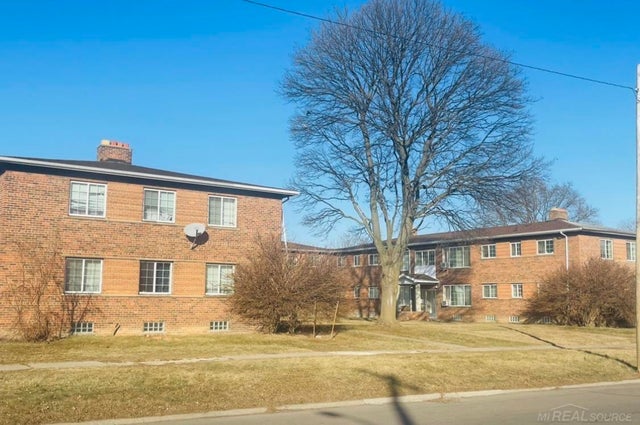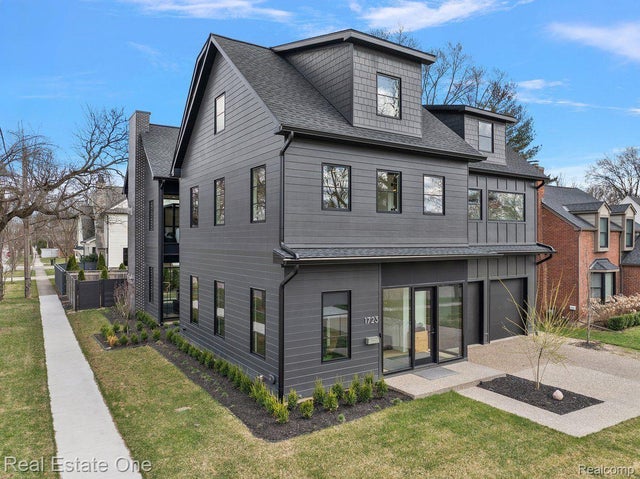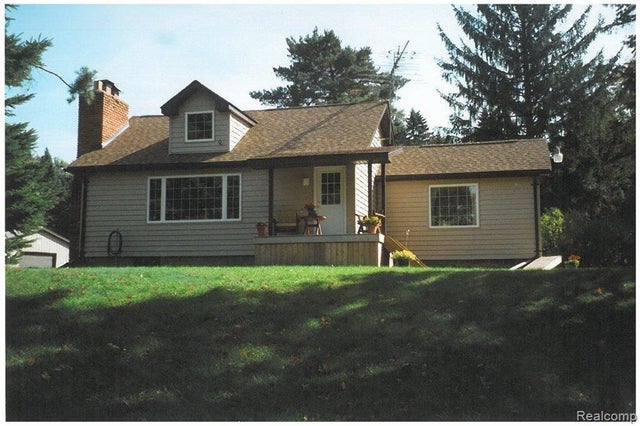In the ever-evolving landscape of real estate, living in Metro Detroit in 2023 has offered a unique perspective on market trends and economic shifts, providing invaluable insights for both residents and those considering moving to Metro Detroit. From the unexpected resilience in home values, despite soaring interest rates, to the nuanced dynamics in the luxury home market and the significant role of FHA and VA loans, the year has been a testament to the region's adaptability and the importance of understanding local market nuances. This comprehensive analysis of the 11 predictions made for the real estate and financial markets of 2023 versus realities not only sheds light on the current state of the Metro Detroit real estate market but also offers a roadmap for navigating future changes, whether you're a long-time resident or planning a move to this vibrant area.

 Prediction 1: Home Values Will Fall by 10-15% in 2023
Prediction 1: Home Values Will Fall by 10-15% in 2023
In a surprising turn of events, the Metro Detroit real estate market in 2023 defied the gloomy predictions made at the end of 2022. Contrary to the forecasted 10-15% drop in home values, the market has exhibited remarkable resilience, with home values actually increasing by over 6%. This unexpected upswing occurred despite the challenging backdrop of soaring interest rates, which peaked at an alarming 8%.
The resilience of the Metro Detroit real estate market can be attributed to a couple of key factors that were initially overlooked by economists and real estate experts. Firstly, the reluctance of homeowners to sell their properties played a significant role. With over 80% of homeowners enjoying mortgage rates at or below 4%, the prospect of trading up to a higher mortgage rate was unappealing. This sentiment was particularly strong among move-up sellers, who faced the double whammy of higher-priced homes and escalating interest rates. Consequently, many potential sellers chose to stay put, leading to a scarcity of available homes on the market.
Another factor that contributed to the market's unexpected performance was the pressure of rising rents on first-time homebuyers, particularly younger millennials. Despite the daunting interest rate hikes, the escalating rental costs compelled many first-time buyers to enter the housing market. This shift in buyer demographics led to an interesting trend: while the average sales price saw a decline of about 5% due to the increased number of first-time buyer sales, the overall home values in the region actually experienced an increase.
 Prediction 2: Interest Rates will Decrease
Prediction 2: Interest Rates will Decrease
The second prediction for the Metro Detroit real estate market in 2023 revolved around interest rates, and this time, the forecast hit the mark. After experiencing a brief period of soaring interest rates, peaking at around 8% for a span of 30 to 45 days, depending on the lender, rates have since moderated. Currently, they are hovering in the high 6% range, occasionally brushing against 7%. This fluctuation in interest rates has been a significant factor influencing the real estate market dynamics in the region.
The Federal Reserve's monetary policy has played a pivotal role in this scenario. After a period of aggressive rate hikes aimed at curbing inflation, the Fed has signaled a shift in its approach. It has committed to implementing between four to six rate cuts in the upcoming year. This move is part of a broader strategy to steer the economy on a stable path, now that inflation appears to be under control. However, it's important to note that these rate reductions are more likely to materialize towards the end of 2024, rather than at the start of the year.
This cautious approach by the Federal Reserve suggests a gradual easing of interest rates, which could have significant implications for the Metro Detroit real estate market. Potential homebuyers who have been sidelined due to the high rates might find more favorable conditions as we move towards the latter part of 2024. This could potentially increase buyer activity in the market, providing a boost to both home sales and values.
 Prediction 3: HELOCs Will Increase Drastically
Prediction 3: HELOCs Will Increase Drastically
The third prediction for the Metro Detroit real estate market in 2023 centered on the expected surge in Home Equity Lines of Credit (HELOCs). The outcome of this prediction was somewhat mixed. While there was an increase in HELOCs, it was not as dramatic as anticipated. HELOCs rose by 40%, a significant uptick, but fell short of the projected 100 to 150% surge. This tempered growth in HELOCs can be attributed to a shift in lending practices observed mid-year, where several banks curtailed the issuance of new HELOCs, pushing homeowners towards cash-out refinances instead.
This shift had notable implications for homeowners. Many who opted for cash-out refinancing had to relinquish their existing, lower mortgage rates — often in the 3-4% range — for higher rates in the 6% to 7% bracket. The driving force behind this trend was the explosion in consumer debt, particularly credit card debt, which soared over the past two years. With credit card interest rates ranging from 15% to 30%, many homeowners found themselves grappling with blended interest rates (incorporating mortgage, credit card, and other loan rates) in the 11-13% range. Consolidating these debts into a single payment at around 7% seemed a prudent financial move for many.
However, this trend raises concerns reminiscent of the pre-2008 era. The key question is whether homeowners are using their properties as an ATM, as seen from 2002 to 2007, thereby diminishing their equity, or if they are adjusting their spending habits and lifestyle. Early indicators, such as an 8% year-over-year increase in holiday shopping to record levels, suggest that consumer spending habits may not have significantly changed. This is a critical point to monitor, especially considering that American homeowners currently have record-high average equity. If this trend leads to a reduction in average equity from 56% to around 10%, the market could face challenges similar to those experienced in 2008, where homeowners began walking away from their homes and loans.
 Prediction 4: New Home Construction will Fall by 50%
Prediction 4: New Home Construction will Fall by 50%
The fourth prediction for the Metro Detroit real estate market in 2023 was a significant decrease in new home construction, estimated to fall by 50%. This prediction turned out to be accurate, as builders indeed slashed new construction starts by nearly half. This reduction in new home construction reflects the shifting dynamics in the housing market and the broader economic environment.
In response to the slowdown in construction, builders have implemented various incentives to attract buyers. These incentives range from financial perks to upgraded features, aiming to make new homes more appealing in a market that has seen a decrease in overall activity. This strategy marks a notable shift from the previous years, where the demand for new homes was robust, and builders had less need to incentivize purchases.
An interesting development in this context is the return of builders to the practice of paying commissions to real estate agents. During the boom years, some major builders, like Lennar, had eliminated Realtor commissions. However, with the current market conditions, these builders are once again offering commissions to agents who bring buyers, signaling a renewed recognition of the value that real estate professionals bring to the home selling process.
Another significant trend emerging in the new home construction sector is the shift towards building smaller, more affordable homes. This change is a direct response to market demands, as affordability becomes a growing concern for many potential homebuyers. Builders are adapting to these needs by focusing on smaller-scale projects that are more financially accessible to a broader range of buyers, particularly first-time homeowners, buyers looking for more budget-friendly options, and those who may be looking to move to Metro Detroit.

 Prediction 5: The Stock Market Will Begin to Recover
Prediction 5: The Stock Market Will Begin to Recover
The fifth prediction for 2023, extending beyond the realm of real estate into the broader financial market, was a recovery in the stock market. After a tumultuous end to 2022 and a rocky start to the new year, this prediction was keenly observed by investors and industry professionals alike. True to the forecast, both the Dow Jones Industrial Average and the NASDAQ Composite showed remarkable resilience, bouncing back as the year progressed.
This recovery in the stock market is a testament to the enduring wisdom shared by Morgan Housel in his acclaimed book, "The Psychology of Money." Housel emphasizes the importance of holding steady through the market's inevitable fluctuations, rather than attempting to time the market. The 2023 market recovery exemplifies this principle, demonstrating that patience and a long-term perspective can be more rewarding than reactive, short-term strategies.
For the Metro Detroit real estate market, the recovery of the stock market has several implications. Firstly, a healthier stock market often translates to increased consumer confidence, which can positively impact the real estate sector. Homebuyers and investors, feeling more secure about their financial portfolios, may be more inclined to engage in real estate transactions.
Additionally, the correlation between the stock market and the real estate market can sometimes offer indirect benefits. For instance, a recovering stock market can lead to improved economic conditions, which in turn can support a stronger job market. A robust job market is a critical factor in maintaining a healthy real estate market, as it directly influences buyers' ability to purchase homes and investors' confidence in the real estate sector.
 Prediction 6: Inflation Rates Will Drop
Prediction 6: Inflation Rates Will Drop
The sixth prediction for 2023 focused on the trajectory of inflation rates, anticipating a decline throughout the year. This forecast proved accurate, marking a significant shift in the economic landscape from the rampant inflation rates experienced in 2022. The stabilization of inflation is a crucial development, particularly for the Metro Detroit real estate market and the broader economy.
While inflation rates have ceased their steep ascent, it's important to note that prices across various sectors, including essentials like groceries, holiday shopping items, and gasoline, remain elevated. Consumers continue to feel the impact of these high prices, even though the rate at which they are increasing has slowed down considerably from the 7-8-9% rates seen in the previous year.
For the real estate market in Metro Detroit, the stabilization of inflation rates brings a mixed bag of implications. On one hand, the control of inflation can lead to a more predictable economic environment, which is beneficial for both buyers and sellers in the real estate market. It can enhance consumer confidence and provide a more stable backdrop for making significant financial decisions, such as purchasing a home.
On the other hand, the persistently high prices, despite the slowdown in inflation, can continue to strain the budgets of potential homebuyers. This could impact their ability to save for down payments or afford higher-priced homes, particularly in a market where home values have been on the rise.
Furthermore, the Federal Reserve's response to inflation, primarily through interest rate adjustments, will continue to play a critical role in shaping the real estate market. If the Fed deems it necessary to raise interest rates to keep inflation in check, this could lead to higher mortgage rates, affecting affordability and potentially cooling the housing market.
 Prediction 7: Demand for Contractors Will Decrease
Prediction 7: Demand for Contractors Will Decrease
The seventh prediction for 2023 in the Metro Detroit area was a decrease in the demand for contractors throughout the year. While the official data from the Department of Labor and Economic Growth is still pending, early indicators suggest that this prediction is likely to be accurate, especially in the latter half of the year.
Several factors contribute to this anticipated decline in contractor demand. The slowdown in new home construction, as previously discussed, is a significant factor. With fewer new homes being built, the need for contractors in the construction sector naturally diminishes. Additionally, there appears to be a shift in homeowner spending habits regarding home renovations and remodels. During the pandemic, there was a surge in home improvement projects, driven by the increased time people spent at home and the desire to enhance their living spaces. However, as the pandemic's impact wanes, this trend seems to be reversing, leading to reduced spending on home remodels.
Anecdotal evidence also supports this prediction. For instance, the experience of homeowners, such as my parents, who are currently undertaking kitchen renovations, contrasts sharply with the situation in 2022. Last year, securing a contractor for home improvement projects was a challenging endeavor, marked by high costs and, in some cases, subpar work quality. In contrast, the current climate sees kitchen remodeling companies proactively reaching out to clients, eager to schedule projects and keep their workforce employed. This change in the contractor market dynamics indicates a shift from a seller's market, where demand outstripped supply, to a more balanced or even buyer's market.
When the official data is released, it is expected to confirm this trend of decreasing demand for contractors. For those living in Metro Detroit, this shift could have several implications on the real estate market. Homeowners might find it easier and potentially more affordable to undertake renovation projects, given the increased availability and eagerness of contractors. This could lead to an uptick in home improvements, potentially enhancing property values and appeal.

 Prediction 8: The Crypto Winter Will Continue
Prediction 8: The Crypto Winter Will Continue
The eighth prediction for 2023 was the continuation of the 'Crypto Winter,' a term used to describe a prolonged period of stagnation or decline in the cryptocurrency market. This prediction accurately captured the ongoing challenges in the cryptocurrency sector throughout the year. The market experienced further collapses, reinforcing the cautious stance many investors have taken towards digital currencies.
It was only towards the end of 2023 that Bitcoin showed signs of recovery, reaching the $40,000 mark. This rebound, while significant, fell short of the all-time highs around $60,000, aligning with the prediction that the recovery would be substantial but not complete. The cryptocurrency market's volatility and uncertain regulatory environment continue to make it a contentious investment choice.
In contrast to the turbulent crypto market, the real estate sector, particularly investments in properties like Airbnb rentals, has demonstrated more stability and potential for lucrative returns. This stability is further enhanced by the tax incentives associated with real estate investments. For investors in the Metro Detroit area, the comparison between the unpredictable nature of cryptocurrencies and the more tangible, asset-backed nature of real estate investments has been particularly stark in 2023.
The preference for real estate investments over cryptocurrencies can be attributed to several factors. Real estate provides a tangible asset with intrinsic value, which can offer a sense of security that volatile digital currencies do not. Additionally, real estate investments can generate regular income (such as rental income from Airbnb properties), provide tax benefits, and have the potential for long-term appreciation.
 Prediction 9: Luxury Home Sales Will Decrease
Prediction 9: Luxury Home Sales Will Decrease
The ninth prediction for 2023 focused on the luxury home market throughout Michigan, particularly in the Metro Detroit area. The forecast was a decrease in luxury home sales, and the outcome can be best described as a mixed scenario, or a "push."
The luxury real estate market, characterized by homes listed at $1 million and above, experienced a notable shift in dynamics. The time on market for these high-end properties almost tripled, indicating a slowdown in the pace of sales. Concurrently, there was a significant increase in the number of unsold luxury homes being withdrawn from the market, nearly tripling from previous figures. This trend suggests a cooling in the luxury segment, with fewer transactions being completed within the expected time frames.
Despite these changes in market activity, the prices of luxury homes did not show a corresponding decline. This resilience in pricing, even in the face of decreased sales velocity, points to a sustained value perception in the luxury segment. However, the overall number of homes sold in this category saw a 30% decline, aligning with the initial prediction of a downturn in luxury home sales.
For real estate professionals and investors in Metro Detroit, these trends in the luxury market present a nuanced picture. On one hand, the sustained prices indicate a continued demand for high-quality, luxury properties. On the other hand, the increased time on market and the rise in withdrawn listings highlight a more challenging selling environment, possibly due to a combination of economic factors and shifting buyer priorities.
Navigating the luxury real estate market in 2023 requires a deep understanding of these trends and the ability to adapt strategies accordingly. For sellers, it may mean recalibrating expectations around timeframes and marketing approaches. For buyers, the current market conditions could present opportunities to negotiate more favorable terms, given the slower pace of sales.
 Prediction 10: Rent Prices Will Remain High
Prediction 10: Rent Prices Will Remain High
The tenth prediction for 2023 was that rent prices would remain high. This forecast was partially accurate, as the rental market experienced some fluctuations throughout the year. While rent prices did see a decrease of 10-15% from a record high average of $2,000 per month across the United States, the impact of this decline was somewhat nuanced.
The decrease in rent prices, although significant, did not fully alleviate the financial burden for many renters. The earlier spike in rental costs meant that even with the reduction, individuals renewing their leases were facing rent prices that were still 10 to 30% higher than their previous payments. This situation created a challenging scenario for renters, as the 'reduced' rents were still considerably higher than what they had been accustomed to paying.
In Metro Detroit, as in other parts of the country, this dynamic in the rental market had a ripple effect. The persistently high rent, despite the slight decrease, pushed more people towards considering homeownership. Buying a home became an increasingly attractive option for those who found themselves paying significantly higher rents. The prospect of building equity, coupled with the desire for more stable and predictable housing costs, drove many renters to explore the possibility of purchasing a property.
For real estate professionals in Metro Detroit, understanding these shifts in the rental market is crucial. The increased interest in homeownership presents opportunities to guide first-time buyers through the process, offering expertise in navigating the current market conditions. It also underscores the importance of educating potential buyers about the long-term benefits of homeownership versus renting, especially in a market where rental prices remain relatively high.
 Prediction 11: FHA & VA Loans Will Dominate The Market
Prediction 11: FHA & VA Loans Will Dominate The Market
The eleventh and final prediction for the Metro Detroit real estate market in 2023 was the dominance of FHA (Federal Housing Administration) and VA (Veterans Affairs) loans. While these types of loans did see an increase, up by 22% in 2023, the extent of their growth was somewhat less than anticipated. However, this increase, particularly noticeable in the second half of the year, does suggest a shift in the market dynamics.
The rise in FHA and VA loans can be interpreted as an indicator of a slowing market. In a highly competitive market, sellers often have the luxury of choosing from a variety of offers, with different types of financing. In this context, cash offers are typically the most attractive (akin to an 'Ace' in a card game), followed by conventional loans with substantial down payments (the 'Kings' and 'Queens'). FHA and VA loans, which often come with more stringent appraisal requirements and can be more complex to close, are usually less preferred by sellers, comparable to the '10s' and '9s' in a card game.
However, the latter part of 2023 saw a notable change. FHA offers, which are government-backed loans designed to make homeownership more accessible to people with lower credit scores and smaller down payments, started being accepted at higher levels. This trend suggests a shift from the frenzied buyer demand of previous years, influenced by factors such as rising interest rates and a slight decrease in rental costs.
For real estate professionals in Metro Detroit, this shift presents new considerations. Understanding the nuances of different loan types and how they are perceived in the market is crucial for advising clients effectively, whether they are buyers or sellers. For buyers, particularly first-time homebuyers or those with limited down payment resources, FHA and VA loans can provide viable pathways to homeownership. For sellers, being open to these types of loans can broaden the pool of potential buyers, especially in a market that is becoming less frantic.
As we reflect on the year's journey through the Metro Detroit real estate market, it becomes clear that living in Metro Detroit offers a dynamic and multifaceted experience, shaped by a range of economic and market forces. For those moving to Metro Detroit, understanding the intricacies of this market—from the resilience of home values amidst fluctuating interest rates to the evolving preferences in home financing—is crucial. The insights gleaned from analyzing the predictions and outcomes of 2023 serve not only as a valuable resource for current residents but also as a guiding light for newcomers. They underscore the importance of staying informed and adaptable, whether you're deeply rooted in the community or just beginning your journey in the vibrant and ever-changing landscape of Metro Detroit real estate.
Contemplating a move to Metro Detroit? See a list of available homes below.
Metro Detroit Homes for Sale
Posted by Michael Perna on





















































Leave A Comment